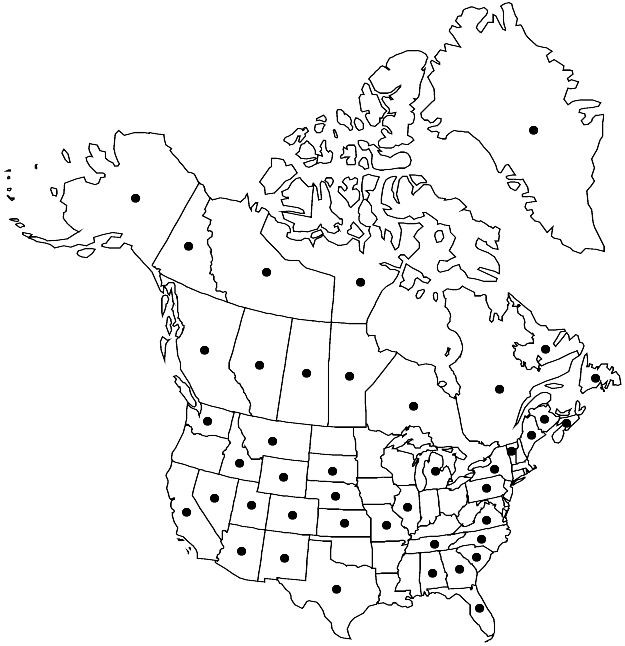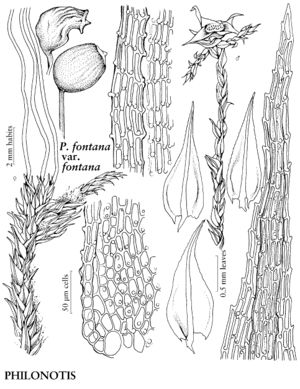Difference between revisions of "Philonotis fontana var. fontana"
FNA>Volume Importer |
FNA>Volume Importer |
||
| Line 1: | Line 1: | ||
{{Treatment/ID | {{Treatment/ID | ||
|accepted_name=Philonotis fontana var. fontana | |accepted_name=Philonotis fontana var. fontana | ||
| − | |accepted_authority= | + | |accepted_authority= |
|publications= | |publications= | ||
|basionyms= | |basionyms= | ||
| Line 7: | Line 7: | ||
|name=Philonotis fontana var. caespitosa | |name=Philonotis fontana var. caespitosa | ||
|authority=(Juratzka) Schimper | |authority=(Juratzka) Schimper | ||
| + | |rank=variety | ||
}} {{Treatment/ID/Synonym | }} {{Treatment/ID/Synonym | ||
|name=P. fontana var. falcata | |name=P. fontana var. falcata | ||
|authority=(Hooker) Bridel | |authority=(Hooker) Bridel | ||
| + | |rank=variety | ||
}} | }} | ||
|hierarchy=Bartramiaceae;Philonotis;Philonotis fontana;Philonotis fontana var. fontana | |hierarchy=Bartramiaceae;Philonotis;Philonotis fontana;Philonotis fontana var. fontana | ||
| Line 25: | Line 27: | ||
|elevation=low to high elevations (0-3500 m) | |elevation=low to high elevations (0-3500 m) | ||
|distribution=Greenland;Alta.;B.C.;Man.;N.B.;Nfld. and Labr.;N.W.T.;N.S.;Nunavut;Ont.;Que.;Sask.;Yukon;Ala.;Alaska;Ariz.;Calif.;Colo.;Fla.;Ga.;Idaho;Ill.;Kans.;Maine;Mich.;Mo.;Mont.;Nebr.;Nev.;N.Mex.;N.Y.;N.C.;Pa.;S.C.;S.Dak.;Tenn.;Tex.;Utah;Vt.;Va.;Wash.;Wyo.;Mexico;c;w Europe;Asia;e;n Africa. | |distribution=Greenland;Alta.;B.C.;Man.;N.B.;Nfld. and Labr.;N.W.T.;N.S.;Nunavut;Ont.;Que.;Sask.;Yukon;Ala.;Alaska;Ariz.;Calif.;Colo.;Fla.;Ga.;Idaho;Ill.;Kans.;Maine;Mich.;Mo.;Mont.;Nebr.;Nev.;N.Mex.;N.Y.;N.C.;Pa.;S.C.;S.Dak.;Tenn.;Tex.;Utah;Vt.;Va.;Wash.;Wyo.;Mexico;c;w Europe;Asia;e;n Africa. | ||
| − | |discussion=<p>While the breadth of variation in < | + | |discussion=<p>While the breadth of variation in <i></i>var.<i> fontana</i> is immense, crucial characters include the typically robust habit and imbricate, laxly erect, straight, falcate or secund leaves. Plants that are subject to prolonged periods of submersion may develop unusual morphology.</p> |
|tables= | |tables= | ||
|references= | |references= | ||
| Line 34: | Line 36: | ||
-->{{#Taxon: | -->{{#Taxon: | ||
name=Philonotis fontana var. fontana | name=Philonotis fontana var. fontana | ||
| − | + | |authority= | |
| − | |authority= | ||
|rank=variety | |rank=variety | ||
|parent rank=species | |parent rank=species | ||
| Line 49: | Line 50: | ||
|publication year= | |publication year= | ||
|special status= | |special status= | ||
| − | |source xml=https://jpend@bitbucket.org/aafc-mbb/fna-data-curation.git/src/ | + | |source xml=https://jpend@bitbucket.org/aafc-mbb/fna-data-curation.git/src/f50eec43f223ca0e34566be0b046453a0960e173/coarse_grained_fna_xml/V28/V28_177.xml |
|genus=Philonotis | |genus=Philonotis | ||
|species=Philonotis fontana | |species=Philonotis fontana | ||
Revision as of 21:11, 16 December 2019
Plants small to large. Stems 2–20 cm. Leaves with distalmost not spiraled around stem, sometimes appressed, not catenulate, erect to spreading, imbricate, ovate-lanceolate, plane, or 2-plicate near base. Capsule 2–3 mm.
Phenology: Capsules mature year-round.
Habitat: Rock, soil, seepy, open habitats
Elevation: low to high elevations (0-3500 m)
Distribution

Greenland, Alta., B.C., Man., N.B., Nfld. and Labr., N.W.T., N.S., Nunavut, Ont., Que., Sask., Yukon, Ala., Alaska, Ariz., Calif., Colo., Fla., Ga., Idaho, Ill., Kans., Maine, Mich., Mo., Mont., Nebr., Nev., N.Mex., N.Y., N.C., Pa., S.C., S.Dak., Tenn., Tex., Utah, Vt., Va., Wash., Wyo., Mexico, c, w Europe, Asia, e, n Africa.
Discussion
While the breadth of variation in var. fontana is immense, crucial characters include the typically robust habit and imbricate, laxly erect, straight, falcate or secund leaves. Plants that are subject to prolonged periods of submersion may develop unusual morphology.
Selected References
None.
